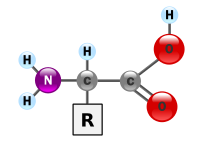
Photo from wikipedia
ObjectiveAnimal protein sources are considered to be of higher quality than plant protein sources in terms of stimulating muscle metabolism. Our objective was to investigate whether protein intake from animal… Click to show full abstract
ObjectiveAnimal protein sources are considered to be of higher quality than plant protein sources in terms of stimulating muscle metabolism. Our objective was to investigate whether protein intake from animal and plant sources on a daily and per-meal basis differs between healthy older adults with normal and with low muscle mass.MethodsIn this cross-sectional study including 100 healthy, community-dwelling adults (51 women) aged 75–85 years without functional limitations dietary intake was assessed using 7-day food records. Protein intake was classified by six animal and six plant protein sources. Skeletal muscle index (SMI) was determined based on bioelectrical impedance analysis and categorized into ‘normal’ or ‘low’ (men ≤ 8.50, women ≤ 5.75 kg/m2). The absolute animal and plant protein intake and their proportion of total protein intake were compared between these groups using Mann–Whitney U test.ResultsDaily protein intake was 0.96 ± 0.27 g/kg body weight (BW), 61 ± 10% hereof were from animal origin with no difference between men and women. SMI was low in 39% of men and 35% of women. No differences in absolute daily animal and plant protein intake between participants with normal vs. low SMI were observed. The proportion of animal protein was not different on neither a daily nor a per-meal basis between those with normal and those with low SMI. Women with low SMI consumed less animal protein (in g) for breakfast (4.8 ± 4.1 g vs. 8.5 ± 6.9 g, p = 0.031) and fewer meals per day with at least 50% animal protein (2.2 ± 0.9 vs. 2.7 ± 1.0, p = 0.046) compared to those with normal SMI.ConclusionOn a daily basis, the absolute and relative animal protein intake does not differ between healthy older adults without functional limitations with normal vs. low SMI. However, our results indicate that in women animal protein intake on a per-meal basis might be of relevance for the maintenance of muscle mass.
Journal Title: Aging Clinical and Experimental Research
Year Published: 2018
Link to full text (if available)
Share on Social Media: Sign Up to like & get
recommendations!